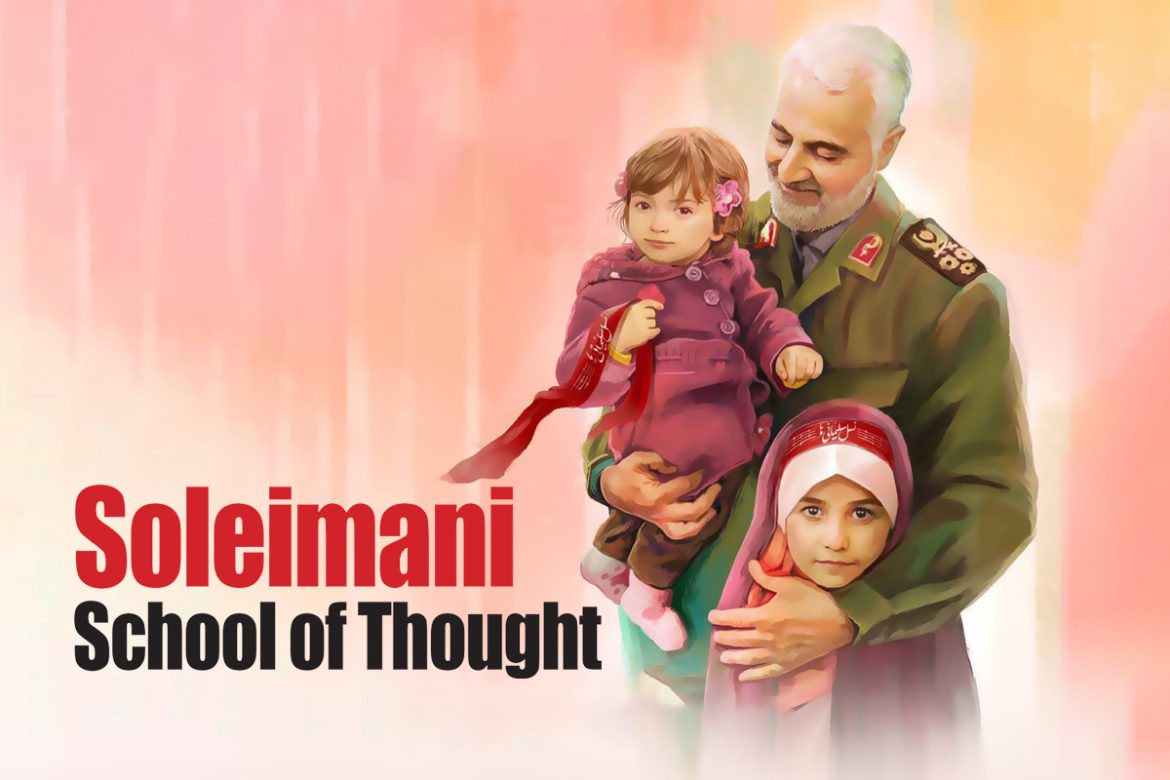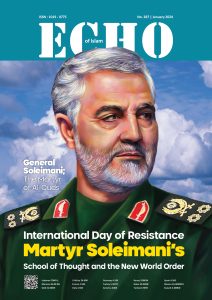Martyr Haj Qasim Soleimani was a devoted soldier of Imam Ruhollah Khomeini (RA) and a commander who climbed the steps of loyalty to his faith in various fields, especially during the eight years of Holy Defense and passed many difficult tests successfully. Following the demise of the late Imam Khomeini (RA), he devotedly continued with his responsibilities under the leadership of Grand Ayatollah Khamenei, the Supreme Leader of the Islamic Revolution. Haj Qasim’s whole being was devoted to the teachings of Islam and with his sincerity he showed the world the concept of soldiering and sacrificing one’s life for one’s faith.
In other words, General Soleimani was a practical example of the high capacities of the dynamic and universal school of pure Muhammadan Islam. He showed that with this school of thought, the world can be managed well, and the religious government can pave man’s path to salvation. What were the characteristics of this great Martyr that made him succeed in penetrating the hearts of all the free people of the world? What made the young and old of the world shed tears of mourning at his loss? Indeed, with his belief in and devotion to the religious teachings of Islam, demonstrating the true dimensions of spirituality, and confronting petrification, he opened a new horizon of religion for the people who were puzzled in the existing turbulent times. Keeping the above-mentioned in view, it can be said that the rules and framework that Haj Qasem followed and paid attention to on his way to success, or in other words, the factors that made his way of thinking become known as “Soleimani School of Thought”, were based on:
- Qasem Soleimani considered himself a student of Imam Khomeini’s school of thought.
- Obedience to the leader and “Vali-e Faqih” formed the main essence of his activities.
- Sincerity in action formed the foundation of Haj Qasem Soleimani’s thoughts and beliefs.
- Being a true follower and not transgressing the red lines of religion even under the most difficult conditions of war and existing environment.
- Generous foresight in marking the circle of insiders regardless of the common categorization of Shia, Sunni, Christian, Armenian, Iranian, Iraqi, Afghan, and existing ethnicities.
- Fighting oppression and arrogance and defending the oppressed people of the world by forming lines of resistance and mobilizing them.
- He considered all the people who somehow move in the path of anti-arrogance and serve the oppressed and disadvantaged as worthy of respect and honor and treated them with humbleness and love.
- The power of creating a discourse for the Islamic world and discussing the issues of the Islamic world at the gatherings of prominent Islamic personalities and resistance forces from all over the world.
- Informing religious scholars and authorities and religious leaders of the world about the suffering of their communities and creating motivation for solving people’s problems.
- Instilling the spirit of independence and fighting against oppression and arrogance in the being of oppressed people.
- Using the means of maximum attraction and minimum repulsion in all fields of activity.
- Belief in the Islamic Republic of Iran as the motherland of Islam and the headquarters of Imam Hossein (AS) on earth after the Ashura uprising.
- Believing in keeping the principle of Velayat-e Faqih alive and the role of religious scholars and authorities in supporting it, in the absence of which the teachings of Islam and the Holy Qur’an would fade away.
- Having a clear and correct perspective about the existing situation in the world and the region, having sufficient knowledge of the relationships and connections between regional and global states, and adopting his stand accordingly; the examples of which were: freeing 48 IRGC hostages in Syria, bringing Russia into Syria, and suppressing ISIS in Iraq and Syria.
- Having tangible and intangible influence on the security services of the countries of the region and encouraging them to support the objectives of the resistance movement.
- Having the aptitude of learning from different situations even if involved opposing camps, etc.
- Indefatigability and encouraging subordinates to work harder by setting short and long-term goals.
- Carrying out heavy and important missions with minimal financial resources and having the skill to create new resources and deploying sincere and honest people to handle them.
- Appointing such commanders for the resistance movement who were of strong personality and trusted by the people of their own nation.
- Having trust in the commanders and officials and giving them all-round support irrespective of their successes and failures.
- He never gave orders to the non-Iranian commanders of the resistance movement, but showed them the way and encouraged them to indigenize their movement in accordance with their own culture.
- He was skilled in interacting with non-Iranian forces in such a way that would be a source of encouragement for them.
- He had the ability to create responsible commanders and officials from people who possessed important capabilities but were neglected by governmental and non-governmental institutions.
- He did not believe in factional and party disputes.
- He was extremely trustworthy and a reliable confidant for others.
- He was very particular about accurate results and followed up on every issue until the result was achieved.
- In critical situations and difficult moments of commanding and guiding the troops, he put his trust in God Almighty and pleaded to the infallible Imams for support.
- He paid attention to various social, political, military, educational, etc. studies and research works to increase efficiency and productivity in accelerating the achievement of the objectives.
- General Soleimani was very particular about planning on the basis of real and available resources, and in other words, he avoided ambitious dreams.
- He cared about the peace and security of the different nationalities of the Axis of Resistance.
- Paying attention to the foundation of the family and the presence of people in defense of their religion as a powerful and influential element in today’s world.
- Living among the masses, being informal, avoiding formalities, and paying regular visits to the grave of Martyr Yusuf Elahi in Kerman Martyrs Cemetery made life meaningful for him.
- Self-purification and paying attention to asceticism and austerity in all moments of life elevated his great soul. His words, towards the end of his life, were replete with mystical meanings.
- He served others selflessly and in return thanked and appreciated the services others to himself and the axis of resistance.
- Strategic attention to maintaining unity in the axis of resistance at different levels.
- In his school of thought, all activities were done for observing one’s duties and responsibilities, not for presenting reports.
To conclude it must be noted that Martyr Soleimani’s School of Thought is one of the basic needs of our society today. Among other achievements of the Soleimani School of Thought, mention can be made of the change of the expansionist strategy of “From Nile to Euphrates” of the Zionist regime, which has by installing high concrete walls around itself confined itself in a self-made prison.
By: IRGC Brigadier General Ali Belali
View this article in Echo of Islam 287





